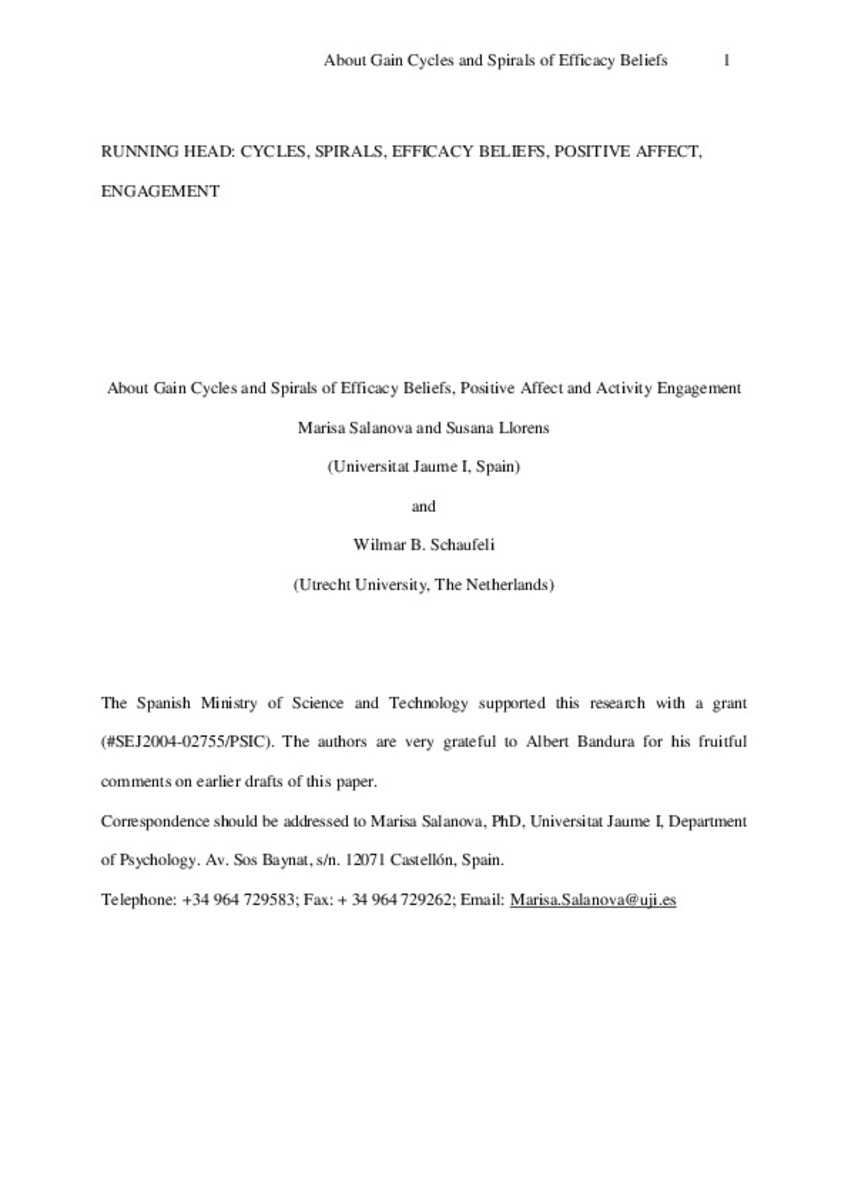Mostrar el registro sencillo del ítem
“Yes, I can, I feel good, and I just do it!”: on gain cycles and spirals of efficacy beliefs, affect, and engagement
| dc.contributor.author | Salanova, Marisa | |
| dc.contributor.author | Llorens Gumbau, Susana | |
| dc.contributor.author | Schaufeli, Wilmar | |
| dc.date.accessioned | 2012-05-18T08:51:42Z | |
| dc.date.available | 2012-05-18T08:51:42Z | |
| dc.date.issued | 2011-04 | |
| dc.identifier.citation | Applied psychology (April 2011), vol. 60, no. 2, 255–285 | ca_CA |
| dc.identifier.issn | 0269-994X | |
| dc.identifier.issn | 1464-0597 | |
| dc.identifier.uri | http://hdl.handle.net/10234/37922 | |
| dc.description.abstract | Taking Bandura's Social Cognitive Theory as our starting point, we tested how efficacy beliefs (self-efficacy and perceived collective efficacy) reciprocally influence activity engagement (vigor, dedication, and absorption) indirectly through their impact on positive affect (enthusiasm, satisfaction, and comfort) over time. We conducted two longitudinal studies using independent samples. Study 1 is a two-wave longitudinal field study that examines gain cycles regarding the dynamic relationships among self-efficacy, positive affect, and work engagement in 274 secondary school teachers. Study 2 is a three-wave longitudinal laboratory study about gain spirals in the dynamic relationships among collective efficacy beliefs, positive affect, and task engagement in 100 university students working in groups. Our findings show that: (1) efficacy beliefs reciprocally influence activity engagement indirectly through their impact on positive affect over time; (2) enthusiasm is the positive affect with the strongest effect on activity engagement; and (3) a gain spiral exists whereby efficacy beliefs increase over time due to engagement and positive affect (most notably enthusiasm). Finally, we discuss the theoretical and practical implications in terms of Social Cognitive Theor | ca_CA |
| dc.format.extent | 39 p. | ca_CA |
| dc.format.mimetype | application/pdf | ca_CA |
| dc.language.iso | eng | ca_CA |
| dc.publisher | Wiley-Blackwell | ca_CA |
| dc.relation.isFormatOf | Pre-print del document publicat a: http://onlinelibrary.wiley.com/doi/10.1111/j.1464-0597.2010.00435.x/abstract | ca_CA |
| dc.rights | © Wiley-Blackwell | ca_CA |
| dc.rights.uri | http://rightsstatements.org/vocab/InC/1.0/ | * |
| dc.subject | Cycles | ca_CA |
| dc.subject | Spirals | ca_CA |
| dc.subject | Efficacy beliefs | ca_CA |
| dc.subject | Positive affect | ca_CA |
| dc.subject | Engagement | ca_CA |
| dc.subject.lcsh | Self-efficacy--Longitudinal studies | ca_CA |
| dc.subject.other | Autoeficàcia--Estudis longitudinals | ca_CA |
| dc.title | “Yes, I can, I feel good, and I just do it!”: on gain cycles and spirals of efficacy beliefs, affect, and engagement | ca_CA |
| dc.title.alternative | About gain cycles and spirals of efficacy beliefs, positive affect and activity engagement | ca_CA |
| dc.type | info:eu-repo/semantics/article | ca_CA |
| dc.identifier.doi | http://dx.doi.org/10.1111/j.1464-0597.2010.00435.x | |
| dc.rights.accessRights | info:eu-repo/semantics/openAccess | ca_CA |
| dc.type.version | info:eu-repo/semantics/submittedVersion | ca_CA |
Ficheros en el ítem
Este ítem aparece en la(s) siguiente(s) colección(ones)
-
PSI_Articles [589]
Articles de publicacions periòdiques







